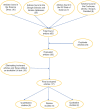Factors Affecting Women's Adjustment to Postpartum Changes: A Narrative Review
- PMID: 33747834
- PMCID: PMC7968582
- DOI: 10.4103/ijnmr.IJNMR_54_20
Factors Affecting Women's Adjustment to Postpartum Changes: A Narrative Review
Abstract
Background: Postpartum period is associated with stress and pressure, and the woman must adjust herself to these changes. This study aimed to review the factors affecting women's adjustment to postpartum changes in conducted studies.
Materials and methods: This review was conducted by searching databases such as ISI Web of Science, Science Direct, Scopus, Cochrane, PubMed and Scientific Information Database (SID), Iranian Medical Articles Database (IranMedex), Iranian Research Institute for Information Science and Technology (IranDoc), and the Iranian Magazine Database (MagIran), as well as searching through Google Scholar (as a Web search engine) in December 2019. Publications from July 2004 to October 2019 were reviewed and limited to Persian and English. The keywords used included "Postpartum", "Women's needs", "Adjustment" and "Coping". After reviewing the articles, out of 60 original articles, 17 articles were selected for final evaluation.
Results: Factors affecting adjustment to postpartum changes were divided into personal and social factors. Personal factors included previous experiences, coping styles and strategies, personality traits, self-efficacy and awareness, and social factors included family and relatives, healthcare providers, cultural context, and laws and regulations.
Conclusions: Adjustment to postpartum changes depends on the personal and social factors that can interact with each other. Women's awareness enables them to use positive coping strategies in this critical situation. Educating women's spouse and family members can contribute to increase the women's social support. Additionally, the law support guarantees the implementation of many interventions in promoting the mother's health.
Keywords: Adaptation; postnatal care; postpartum period; psychological; women.
Copyright: © 2020 Iranian Journal of Nursing and Midwifery Research.
Conflict of interest statement
Nothing to declare.
Figures
Similar articles
-
Factors Associated with the Involvement of Women Drug Users in Risky Sexual Behaviors: A Narrative Review.Iran J Nurs Midwifery Res. 2022 Sep 14;27(5):353-362. doi: 10.4103/ijnmr.ijnmr_318_21. eCollection 2022 Sep-Oct. Iran J Nurs Midwifery Res. 2022. PMID: 36524133 Free PMC article. Review.
-
The Needs of Women Survivors of Rape: A Narrative Review.Iran J Nurs Midwifery Res. 2023 Nov 9;28(6):633-641. doi: 10.4103/ijnmr.ijnmr_395_22. eCollection 2023 Nov-Dec. Iran J Nurs Midwifery Res. 2023. PMID: 38205419 Free PMC article. Review.
-
Factors Influencing the Delay in Childbearing: A Narrative Review.Iran J Nurs Midwifery Res. 2023 Jan 27;28(1):10-19. doi: 10.4103/ijnmr.ijnmr_65_22. eCollection 2023 Jan-Feb. Iran J Nurs Midwifery Res. 2023. PMID: 37250942 Free PMC article. Review.
-
Beyond the black stump: rapid reviews of health research issues affecting regional, rural and remote Australia.Med J Aust. 2020 Dec;213 Suppl 11:S3-S32.e1. doi: 10.5694/mja2.50881. Med J Aust. 2020. PMID: 33314144
-
Bio-Psycho-Social Factors Affecting Women's Sexual Function during Pregnancy: A Narrative Review.Glob J Health Sci. 2016 Oct 1;8(10):55246. doi: 10.5539/gjhs.v8n10p9. Glob J Health Sci. 2016. PMID: 27302438
Cited by
-
I've Grown a Human, but I Don't Feel Like 'Me' Anymore: Body Image Narratives in Early Motherhood in Australia.Health Promot J Austr. 2025 Apr;36(2):e70034. doi: 10.1002/hpja.70034. Health Promot J Austr. 2025. PMID: 40123174 Free PMC article.
-
Social Support Postpartum: Bengali Women from India on Their Coping Experiences following Childbirth.Int J Environ Res Public Health. 2024 Apr 28;21(5):557. doi: 10.3390/ijerph21050557. Int J Environ Res Public Health. 2024. PMID: 38791772 Free PMC article.
-
Identifying women's needs to adjust to postpartum changes: a qualitative study in Iran.BMC Pregnancy Childbirth. 2022 Feb 11;22(1):115. doi: 10.1186/s12884-022-04459-8. BMC Pregnancy Childbirth. 2022. PMID: 35148718 Free PMC article.
-
Kinesiophobia and related factors in cancer patients with TIAPs during the long term: a cross-sectional survey.Support Care Cancer. 2022 Jun;30(6):4927-4934. doi: 10.1007/s00520-022-06842-9. Epub 2022 Feb 17. Support Care Cancer. 2022. PMID: 35175418
-
Social support as a coping resource for psychosocial conditions in postpartum period: a systematic review and logic framework.BMC Psychol. 2024 May 28;12(1):301. doi: 10.1186/s40359-024-01814-6. BMC Psychol. 2024. PMID: 38807228 Free PMC article.
References
-
- Piontkowski S. First baby, first year: Gratitude and emotional approach coping as predictors of adjustment and life satisfaction during the transition to motherhood. Thesis for Master of Arts, Faculty of the Graduate School of the University of Maryland. 2011
-
- Weiss M, Fawcett J, Aber C. Adaptation, postpartum concerns, and learning needs in the first two weeks after caesarean birth. J Clin Nurs. 2009;18:2938–48. - PubMed
-
- Fahey JO, Shenassa E. Understanding and meeting the needs of women in the postpartum period: The perinatal maternal health promotion model. J Midwifery Womens Health. 2013;58:613–21. - PubMed
-
- Hung C, Lin C, Stocker J, Yu C. Predictors of postpartum stress. J Clin Nurs. 2011;20:666–74. - PubMed
Publication types
LinkOut - more resources
Full Text Sources
Medical

